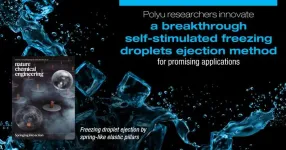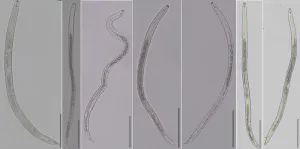(Press-News.org) Positive feedback is helpful for learning, but usually, our greatest lessons actually come from failure— and a new project at the University of Pittsburgh aims to uncover the neural mechanisms behind this phenomenon.
Helen Schwerdt, assistant professor of bioengineering at Pitt’s Swanson School of Engineering, received a five-year, $2.5 million R01 award from the National Institutes of Health (NIH) to study dopamine’s role in learning. Schwerdt’s team develops novel multimodal neural interfaces to understand how the brain and pathological mechanisms work and to improve treatment of debilitating neurological disorders.
“We’re interested in developing technologies to measure molecules in the brain, and figuring out how to optimally combine these types of molecular measurements with the conventional electrical measurements that we typically use to look at brain activity.” Schwerdt said. “Communication between neurons occurs both electrically and chemically, but the chemical aspect is less understood because we haven't had the right tools to measure these signals together.”
Dopamine is a neurotransmitter found in the brain that plays a role in many body functions, including memory, movement, motivation, mood, attention and more. Schwerdt plans to investigate the lesser-known role of dopamine in learning, especially its connection to learning from punishment, which has received less attention compared to its role in reward systems.
“Reward is very important, and it’s an incentive for us to learn new things. But in real life, we commonly learn from negative incentives as well.” Schwerdt said. “The question is, how does the brain handle these two different types of incentives — is it the same circuits and the same neurons that handle both reward and punishment, or are they different?”
Schwerdt’s team has developed a method for sustained dopamine monitoring by implanting neural interfaces in Rhesus monkeys. Monitoring dopamine in the brain for years at a time will help the team measure dopamine’s impact over the course of learning, and dispersing the sensors in different areas of the brain will help the team assess how dopamine levels fluctuate differently in different brain areas.
“We fabricate the sensors in our lab, and when we implant them, we disperse the sensors all across the striatum, because the dopamine appears differently depending on where you record it in the brain.” Schwerdt said. “I believe that a lot of important past studies support the idea that the punishment-related dopamine signals are going to be in different areas of the brain than the reward-related signals.”
Once the neural interfaces are implanted, the team will test the monkeys with a set of trial and error learning tasks to examine how the dopamine behaves in real time. This will allow the team to learn if certain areas in the striatal brain region produce negative punishment related signals and assess how the signals evolve during the course of learning.
This project could eventually lead to a baseline standard that reveals how dopamine is behaving across the primate striatum during important cognitive behaviors. Studies of humans with Parkinson’s disease have shown impairments in learning from rewards and punishments, and Schwerdt hopes that these findings can also be translated into better understanding the disease, where dopamine dysregulation is a major factor.
"In the future, I would like to test these behaviors in a model of Parkinson's disease so we can study how dopamine signals in the striatum change and how these changes contribute to behavioral symptoms.” Schwerdt said. “I'm particularly interested in exploring how these dopamine signals could be used as biomarkers to guide future treatments."
END
Diving deep into dopamine
Bioengineering's Helen Schwerdt receives $2.5 million R01 to investigate dopamine’s role in learning
2025-01-14
ELSE PRESS RELEASES FROM THIS DATE:
Automatic speech recognition on par with humans in noisy conditions
2025-01-14
Automatic speech recognition (ASR) has made incredible advances in the past few years, especially for widely spoken languages such as English. Prior to 2020, it was typically assumed that human abilities for speech recognition far exceeded automatic systems, yet some current systems have started to match human performance. The goal in developing ASR systems has always been to lower the error rate, regardless of how people perform in the same environment. After all, not even people will recognize speech with 100% accuracy in a noisy environment.
In a new study, UZH computational linguistics specialist Eleanor Chodroff and a fellow researcher from Cambridge ...
PolyU researchers develop breakthrough method for self-stimulated ejection of freezing droplets, unlocking cost-effective applications in de-icing
2025-01-14
Water droplets under freezing conditions do not spontaneously detach from surfaces as they do at room temperature due to stronger droplet-surface interaction and lack of an energy transformation pathway. Since accumulated droplets or ice have to be removed manually or with mechanical equipment, which is costly and inefficient, preventing droplet accretion on surfaces is both scientifically intriguing and practically important. Researchers at The Hong Kong Polytechnic University (PolyU) have invented a ground-breaking self-powered mechanism of freezing droplet ejection that allows droplets to ...
85% of Mexican Americans with dementia unaware of diagnosis, outpacing overall rate
2025-01-14
More than three-quarters of older adults with dementia may be unaware of their diagnosis, a University of Michigan study finds.
That number is even higher — up to 85% — among Mexican Americans, who make up the largest share of the U.S. Hispanic and Latino population.
Fewer than 7% of all study participants, who live in Nueces County, Texas and were classified as having probable dementia based on a cognitive assessment, did not have a primary care provider.
The results are published in the Journal of General Internal Medicine.
“Dementia diagnosis unawareness is a public health issue that must be addressed,” ...
Study reveals root-lesion nematodes in maize crops - and one potential new species
2025-01-14
A new study has lifted the lid on five species of root-lesion nematodes living in maize crops across New Zealand - and suggested the existence of a hitherto-unsuspected cryptic species.
The article, ‘Molecular characterization of root-lesion nematode, (Pratylenchus spp.) and their prevalence in New Zealand maize fields’, is published in Letters in Applied Microbiology, an Applied Microbiology International publication.
Identifying these nematodes and understanding their distribution will enable targeted pest management strategies, helping to protect crop yields and maintain agricultural ...
Bioinspired weather-responsive adaptive shading
2025-01-14
Pine cones as a model: Researchers at the universities of Stuttgart and Freiburg have developed a new, energy-autonomous facade system that adapts passively to the weather. The journal Nature Communications has published the research results.
"Most attempts at weather responsiveness in architectural facades rely heavily on elaborate technical devices. Our research explores how we can harness the responsiveness of the material itself through advanced computational design and additive manufacturing," says Professor Achim Menges, head of the Institute for Computational Design and Construction ...
Researchers uncover what drives aggressive bone cancer
2025-01-14
Researchers uncover what drives aggressive bone cancer
Large-scale analysis of patient cohorts reveals a novel mechanism driving osteosarcoma, an aggressive paediatric bone cancer.
The researchers show that this mechanism occurs in approximately 50% of high-grade osteosarcoma cases.
This research also provides insights to help predict osteosarcoma patient outcomes which can help improve the management of this disease.
Osteosarcoma is a type of aggressive bone cancer that most commonly affects children and young adults between the ages of 10 and 20, during times ...
Just as Gouda: Improving the quality of cheese alternatives
2025-01-14
WASHINGTON, Jan. 14, 2025 – Plant-based dairy products are a great alternative for people who avoid animal products, but manufacturers have a hard time replicating the creamy, cheesy qualities that make dairy so indulgent.
Scientists from the University of Guelph in Ontario and Canadian Light Source Inc. in Saskatchewan are working to produce plant-based cheese with all the characteristics of real cheese, but with better health benefits.
In Physics of Fluids, by AIP Publishing, researchers studied multiple types of plant-based proteins and how they interact with ...
Digital meditation to target employee stress
2025-01-14
About The Study: The findings of this study suggest that a brief, digital mindfulness-based program is an easily accessible and scalable method for reducing perceptions of stress. Future work should seek to clarify mechanisms by which such interventions contribute to improvements in work-specific well-being.
Corresponding Author: To contact the corresponding author, Aric A. Prather, PhD, email aric.prather@ucsf.edu.
To access the embargoed study: Visit our For The Media website at this link https://media.jamanetwork.com/
(doi:10.1001/jamanetworkopen.2024.54435)
Editor’s Note: Please see ...
Electronic patient-reported outcome system implementation in outpatient cardiovascular care
2025-01-14
About The Study: In this randomized clinical trial, implementation of the electronic patient-reported outcome (ePRO) monitoring system significantly enhanced patient-physician communication and the clarity of physicians’ explanations about treatment. These findings suggest that the ePRO monitoring system is capable of supporting patient-centered cardiovascular care.
Corresponding Author: To contact the corresponding author, Yoshinori Katsumata, MD, PhD, email goodcentury21@keio.jp.
To ...
Knowledge and use of menthol-mimicking cigarettes among adults in the US
2025-01-14
About The Study: In this survey study of U.S. adults, a substantial proportion were aware of and had already experimented with synthetic cooling agent menthol-mimicking cigarettes. These products may serve as a substitute for menthol cigarettes and reduce the public health benefits of a menthol cigarette ban in promoting smoking cessation.
Corresponding Author: To contact the corresponding author, Kelvin Choi, PhD, email kelvin.choi@nih.gov.
To access the embargoed study: Visit our For The Media website at this link https://media.jamanetwork.com/
(doi:10.1001/jamanetworkopen.2024.54608)
Editor’s ...
LAST 30 PRESS RELEASES:
Alkali cation effects in electrochemical carbon dioxide reduction
Test platforms for charging wireless cars now fit on a bench
$3 million NIH grant funds national study of Medicare Advantage’s benefit expansion into social supports
Amplified Sciences achieves CAP accreditation for cutting-edge diagnostic lab
Fred Hutch announces 12 recipients of the annual Harold M. Weintraub Graduate Student Award
Native forest litter helps rebuild soil life in post-mining landscapes
Mountain soils in arid regions may emit more greenhouse gas as climate shifts, new study finds
Pairing biochar with other soil amendments could unlock stronger gains in soil health
Why do we get a skip in our step when we’re happy? Thank dopamine
UC Irvine scientists uncover cellular mechanism behind muscle repair
Platform to map living brain noninvasively takes next big step
Stress-testing the Cascadia Subduction Zone reveals variability that could impact how earthquakes spread
We may be underestimating the true carbon cost of northern wildfires
Blood test predicts which bladder cancer patients may safely skip surgery
Kennesaw State's Vijay Anand honored as National Academy of Inventors Senior Member
Recovery from whaling reveals the role of age in Humpback reproduction
Can the canny tick help prevent disease like MS and cancer?
Newcomer children show lower rates of emergency department use for non‑urgent conditions, study finds
Cognitive and neuropsychiatric function in former American football players
From trash to climate tech: rubber gloves find new life as carbon capturers materials
A step towards needed treatments for hantaviruses in new molecular map
Boys are more motivated, while girls are more compassionate?
Study identifies opposing roles for IL6 and IL6R in long-term mortality
AI accurately spots medical disorder from privacy-conscious hand images
Transient Pauli blocking for broadband ultrafast optical switching
Political polarization can spur CO2 emissions, stymie climate action
Researchers develop new strategy for improving inverted perovskite solar cells
Yes! The role of YAP and CTGF as potential therapeutic targets for preventing severe liver disease
Pancreatic cancer may begin hiding from the immune system earlier than we thought
Robotic wing inspired by nature delivers leap in underwater stability
[Press-News.org] Diving deep into dopamineBioengineering's Helen Schwerdt receives $2.5 million R01 to investigate dopamine’s role in learning




